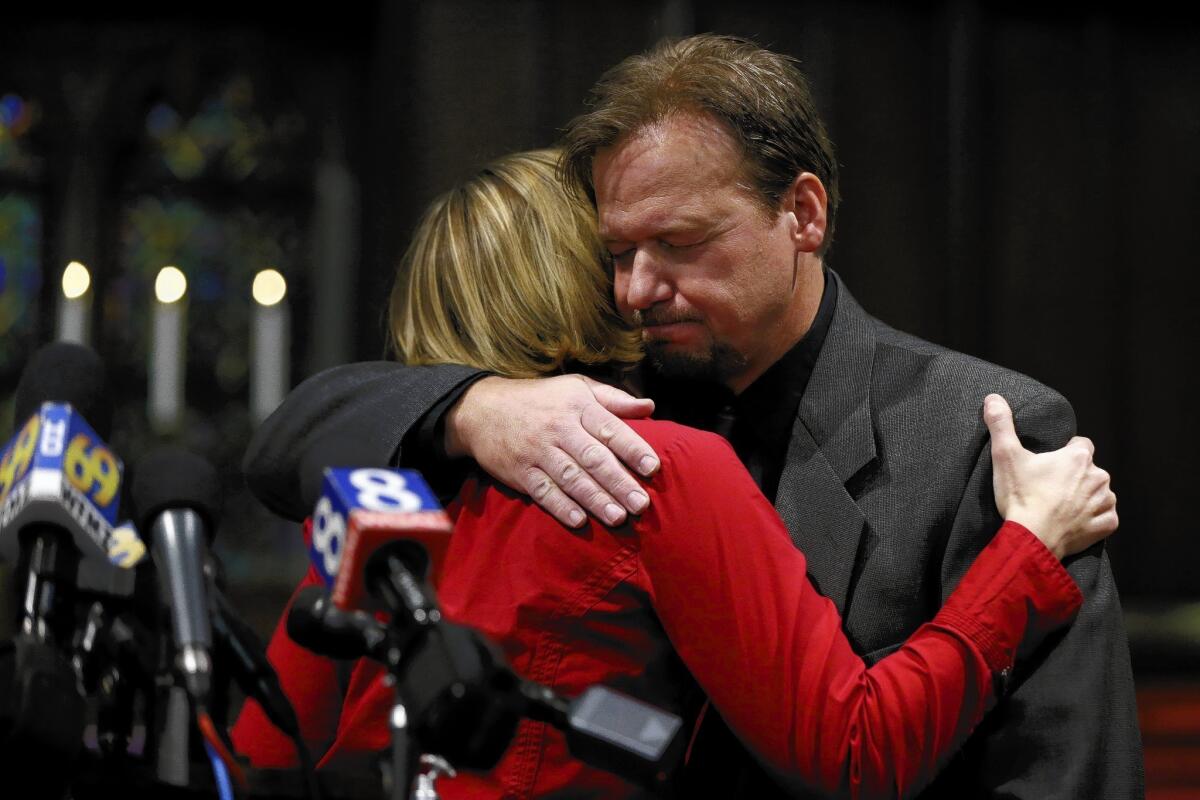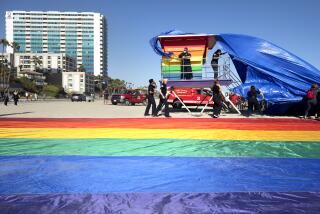United Methodist pastor defrocked over same-sex wedding

NEW YORK — Frank Schaefer had prepared for the worst, but his voice shook Thursday as he described how it felt to be defrocked by the United Methodist Church after he refused to comply with its law against same-sex marriage.
“I guess I took it harder than I thought I would,” Schaefer said shortly after a private meeting in which church officials demanded that the pastor from Lebanon, Pa., surrender his credentials. “I was prepared for it, but it’s traumatic.”
Schaefer, who officiated at his son’s marriage to another man in 2007, appealed, setting the stage for a drawn-out battle over an issue that has put the United Methodist Church at odds with some of its clergy and with public attitudes toward same-sex marriage.
As Schaefer was being defrocked Thursday, New Mexico was becoming the latest state in the country to permit same-sex marriage. Seventeen states and the District of Columbia now recognize gay marriage, and Americans who accept it have increased from 35% in 2001 to about 50% now, according to the Pew Research Center.
But the United Methodist Church’s Book of Discipline does not, and clergy who are openly gay or who perform gay weddings are violating church law. Schaefer, 52, said he could not abide by a law “that is hurtful and harmful.”
In a statement, Bishop Peggy A. Johnson of the United Methodist Church’s Eastern Pennsylvania Conference said Schaefer’s actions left church officials no choice but to oust him after 17 years as an ordained minister.
“No doubt this has been a long, difficult ordeal for Rev. Schaefer and his family, and for many members of the Eastern Pennsylvania Conference,” Johnson said.
Last month, a jury of fellow pastors convicted Schaefer of violating church law for presiding over the April 2007 marriage of his gay son, Tim, in Massachusetts. Schaefer was suspended for one month and told that if he declared himself willing to obey the church’s rules, he could retain his credentials. He said he could not swear never to perform another gay marriage, noting that three of his four children are gay.
His suspension ended Thursday, and about 9:30 a.m., Schaefer walked into a meeting with church leaders in Pennsylvania to give them his decision.
“It was pretty clear-cut,” said Schaefer, who earlier in the week had held a news conference to declare that he would not change his stance. He repeated that to the church officials, who responded by telling him his credentials were revoked.
Schaefer was at least the second United Methodist pastor to be defrocked since 2005, when Beth Stroud, also of Pennsylvania, was ousted for being openly gay. Others have been suspended for performing same-sex weddings, including the Rev. Amy DeLong in Wisconsin in 2011 and the Rev. Greg Dell in Chicago in 1999.
More cases are imminent, including that of Thomas Ogletree, the retired dean of the Yale Divinity School. Like Schaefer, Ogletree performed the wedding ceremony for his gay son last year in New York.
“Performing their wedding was one of the most meaningful ritual acts of my life,” Ogletree said later.
Officials in the United Methodist Church say they recognize there are “divisive opinions” on the issue of same-sex marriage, but at the church’s last general conference in 2012, delegates upheld language declaring homosexuality “incompatible with Christian teaching.”
Schaefer, who was pastor at the Zion United Methodist Church of Iona in Lebanon for 11 years, says he sees signs of change. He noted that Bishop Johnson, in response to a petition submitted Monday by supporting clergy, agreed with them that the church’s rules on same-sex marriage and the ordination of gays are “discriminatory” and clash with its broader teachings. The church does not forbid gay members.
In her response, Johnson also agreed that church trials related to the issue were “not helpful.”
“For the bishop to come out and say, ‘Yes, those laws are discriminatory,’ that is huge,” said Schaefer, who is hopeful his case will lead to bigger change.
“Obviously it’s traumatic for me. I’m mourning over losing my credentials,” he said. “But sometimes, maybe something drastic has to happen before real change can occur.”
More to Read
Sign up for Essential California
The most important California stories and recommendations in your inbox every morning.
You may occasionally receive promotional content from the Los Angeles Times.











